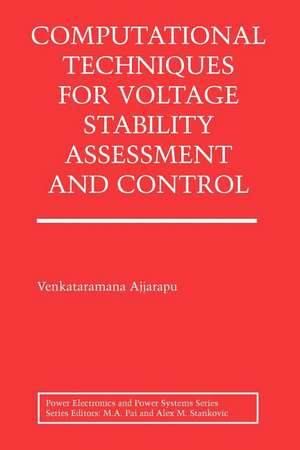Computational Techniques for Voltage Stability Assessment and Control: Power Electronics and Power Systems
Autor Venkataramana Ajjarapuen Limba Engleză Paperback – 25 noi 2010
| Toate formatele și edițiile | Preț | Express |
|---|---|---|
| Paperback (1) | 942.94 lei 6-8 săpt. | |
| Springer Us – 25 noi 2010 | 942.94 lei 6-8 săpt. | |
| Hardback (1) | 949.23 lei 6-8 săpt. | |
| Springer Us – 28 dec 2006 | 949.23 lei 6-8 săpt. |
Din seria Power Electronics and Power Systems
- 18%
 Preț: 944.19 lei
Preț: 944.19 lei -
 Preț: 487.37 lei
Preț: 487.37 lei - 20%
 Preț: 630.01 lei
Preț: 630.01 lei - 15%
 Preț: 648.56 lei
Preț: 648.56 lei - 15%
 Preț: 643.84 lei
Preț: 643.84 lei - 18%
 Preț: 1113.89 lei
Preț: 1113.89 lei - 18%
 Preț: 1120.99 lei
Preț: 1120.99 lei - 18%
 Preț: 950.33 lei
Preț: 950.33 lei - 18%
 Preț: 1981.53 lei
Preț: 1981.53 lei - 15%
 Preț: 638.43 lei
Preț: 638.43 lei - 18%
 Preț: 1660.95 lei
Preț: 1660.95 lei - 18%
 Preț: 940.87 lei
Preț: 940.87 lei - 15%
 Preț: 637.46 lei
Preț: 637.46 lei - 18%
 Preț: 949.55 lei
Preț: 949.55 lei - 18%
 Preț: 953.65 lei
Preț: 953.65 lei - 18%
 Preț: 953.97 lei
Preț: 953.97 lei - 18%
 Preț: 944.67 lei
Preț: 944.67 lei - 15%
 Preț: 634.32 lei
Preț: 634.32 lei - 18%
 Preț: 832.78 lei
Preț: 832.78 lei - 18%
 Preț: 945.30 lei
Preț: 945.30 lei - 18%
 Preț: 1239.85 lei
Preț: 1239.85 lei - 15%
 Preț: 642.18 lei
Preț: 642.18 lei - 18%
 Preț: 1656.08 lei
Preț: 1656.08 lei - 18%
 Preț: 953.65 lei
Preț: 953.65 lei - 18%
 Preț: 1554.09 lei
Preț: 1554.09 lei - 18%
 Preț: 1657.03 lei
Preț: 1657.03 lei - 18%
 Preț: 951.47 lei
Preț: 951.47 lei - 18%
 Preț: 888.31 lei
Preț: 888.31 lei - 18%
 Preț: 1219.01 lei
Preț: 1219.01 lei - 18%
 Preț: 893.53 lei
Preț: 893.53 lei - 18%
 Preț: 1110.24 lei
Preț: 1110.24 lei - 15%
 Preț: 641.85 lei
Preț: 641.85 lei
Preț: 942.94 lei
Preț vechi: 1149.93 lei
-18% Nou
Puncte Express: 1414
Preț estimativ în valută:
180.45€ • 195.95$ • 151.58£
180.45€ • 195.95$ • 151.58£
Carte tipărită la comandă
Livrare economică 22 aprilie-06 mai
Preluare comenzi: 021 569.72.76
Specificații
ISBN-13: 9781441938626
ISBN-10: 1441938621
Pagini: 264
Ilustrații: XII, 250 p.
Dimensiuni: 155 x 235 x 14 mm
Greutate: 0.37 kg
Ediția:2007
Editura: Springer Us
Colecția Springer
Seria Power Electronics and Power Systems
Locul publicării:New York, NY, United States
ISBN-10: 1441938621
Pagini: 264
Ilustrații: XII, 250 p.
Dimensiuni: 155 x 235 x 14 mm
Greutate: 0.37 kg
Ediția:2007
Editura: Springer Us
Colecția Springer
Seria Power Electronics and Power Systems
Locul publicării:New York, NY, United States
Public țintă
ResearchCuprins
Numerical Bifurcation Techniques.- Continuation Power Flow.- Sensitivity Analysis for Voltage Stability.- Voltage Stability Margin Boundary Tracing.- Time Domain Simulation.
Textul de pe ultima copertă
Voltage stability is a critical issue in the secure operation of the restructured power system. Poor voltage conditions lead not only to voltage collapse in the system but can also induce oscillatory instability that may cause a loss of synchronism. A critical question is how to estimate the distance to voltage instability given the present state of the system.
Computational Techniques for Voltage Stability Assessment and Control brings together in one place the computational tools necessary to compute the voltage stability margin. The basic computational tool for tracing the P-V curve and equilibria tracing is the continuation power flow. This technique as well as the algorithm is explained in detail by the author. Sensitivity of the voltage stability margin to various parameters in the system is discussed extensively both theoretically and in a numerical context.
The key concepts of both saddle node and Hopf bifurcation are covered. These are illustrated with the differential-algebraic equation (DAE) model of the system. The model is complex enough to include Load Tap-Changing transformers as well as HVDC models. The dynamic model of the generating unit includes the exciter since it plays a crucial role in voltage stability. A promising decoupled dynamic simulation technique is introduced for time domain analysis.
Computational Techniques for Voltage Stability Assessment and Control provides the computational tools and algorithms needed for development of on-line voltage security assessment
Computational Techniques for Voltage Stability Assessment and Control brings together in one place the computational tools necessary to compute the voltage stability margin. The basic computational tool for tracing the P-V curve and equilibria tracing is the continuation power flow. This technique as well as the algorithm is explained in detail by the author. Sensitivity of the voltage stability margin to various parameters in the system is discussed extensively both theoretically and in a numerical context.
The key concepts of both saddle node and Hopf bifurcation are covered. These are illustrated with the differential-algebraic equation (DAE) model of the system. The model is complex enough to include Load Tap-Changing transformers as well as HVDC models. The dynamic model of the generating unit includes the exciter since it plays a crucial role in voltage stability. A promising decoupled dynamic simulation technique is introduced for time domain analysis.
Computational Techniques for Voltage Stability Assessment and Control provides the computational tools and algorithms needed for development of on-line voltage security assessment
Caracteristici
Provides all the computational needs related to voltage stability Author has developed web based simulation tools based on this book which users can access to simulate test systems up to the size of 200 buses Includes supplementary material: sn.pub/extras














